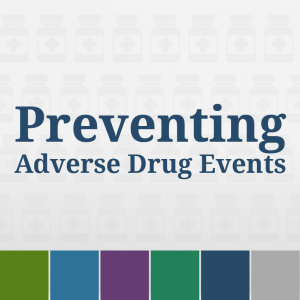Millions of adverse drug events (ADEs) happen every year, and diabetes medications are one of the most common causes of emergency department visits for ADEs in people age 65 and older. That’s why the Office of Disease Prevention and Health Promotion (ODPHP) developed a training to help health professionals reduce hypoglycemic ADEs in patients with diabetes, particularly older adults.
The training, Preventing Adverse Drug Events: Individualizing Glycemic Targets Using Health Literacy Strategies, emphasizes effective communication strategies that increase patients’ health literacy — and that can make a big difference. For example, research has shown that type 2 diabetes patients with higher health literacy take better care of themselves and are more likely to recognize symptoms of hypoglycemia.
Creating Meaningful Educational Opportunities
The American Public Health Association (APHA) is in the process of independently evaluating the training to find out if it’s meeting the needs of the target audiences.
“It’s important to have trainings that are meaningful and useful in order to truly enhance skills and knowledge,” says Mighty Fine, Director of the Center for Public Health Practice and Professional Development at APHA. “There was time and effort put into the development of the training, so let’s see what the return on that investment is.”
The evaluation involves 2 surveys. Participants will take the first survey immediately after completing the training. Then, after at least a month, APHA will ask participants to complete a second survey. Dr. Jamila Porter, President and Founder of The Stellaire Group and the lead evaluator of the training, says the surveys will allow evaluators to measure key concepts over time.
“Once participants take the training, their completion of the surveys will help us determine how much knowledge they’ve gained and how likely they are to practice clinical behaviors that can prevent ADEs. Through the evaluation, we also hope to learn more about the supports that clinicians need to effectively prevent hypoglycemia-related ADEs.”
Meeting Stakeholders’ Needs — Now and in the Future
The evaluation findings will show what’s working well in the training and where there’s room for improvement. And Mr. Fine notes that the findings won’t just help ODPHP improve this particular training — they’ll also help identify strategies for developing effective online trainings going forward. Dr. Porter agrees: “The more information we have to improve existing trainings, the better future trainings will be.”
ODPHP hopes to use the results of APHA’s evaluation to make sure that the training helps health professionals improve health literacy in patients with diabetes. “The training emphasizes the importance of clinicians and patients working collaboratively to make important health decisions. We hope the training’s emphasis on health literacy strategies will be useful to clinicians who want to enhance their skills and empower their patients,” Dr. Porter says.
“If health literacy practices are institutionalized in health care systems, it’ll be better for both patients and clinicians,” adds Mr. Fine. “When patients understand what their doctors are telling them and they feel comfortable asking questions, they’re empowered to play an active role in their health care.”
You can be part of APHA’s evaluation. Take the training today — and complete both surveys when you’re finished!




